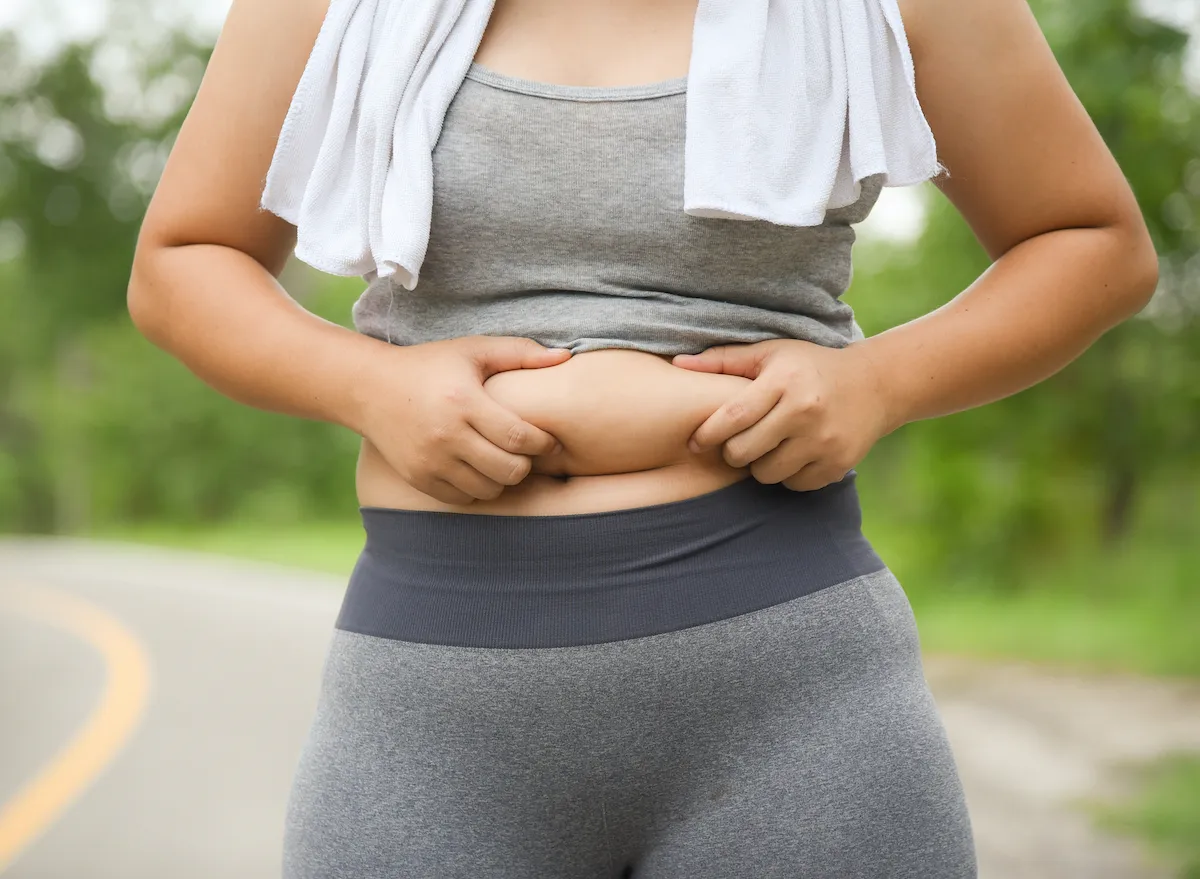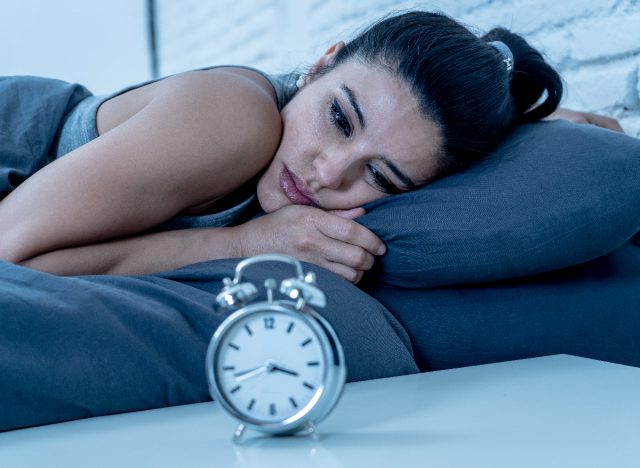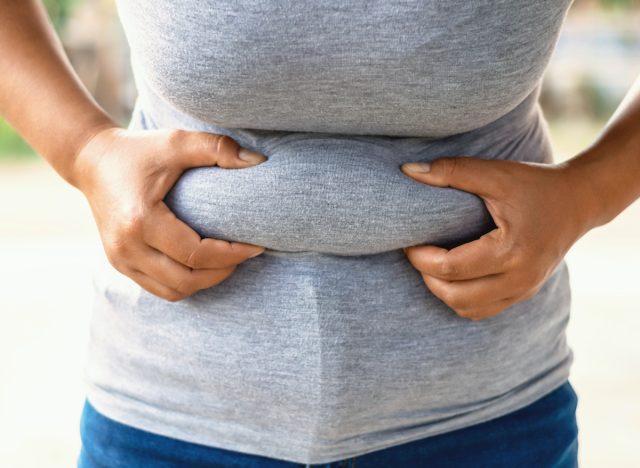6 Reasons Why You’re Not Losing Stubborn Belly Fat

Melting unwanted belly fat can be the most difficult—not to mention, downright frustrating—part of losing weight. Abdominal fat is easy to accumulate and usually the last to go. If you’re seemingly doing everything right in your diet and fitness routine, but your belly fat still won’t budge, it’s time to reassess your course of attack and uncover the sneaky little habits that are holding you back from progress. We spoke with Victoria Brady, a personal trainer on Fyt, and Lisa Young, Ph.D., RDN, the author of Finally Full, Finally Slim, a nutritionist in private practice, and a member of our Medical Expert Board, who call out the most common reasons why you’re not losing belly fat. If you recognize any of these habits in your daily routine, it’s time to nix and fix them ASAP.
When it comes down to it, don’t lose hope when it comes to shrinking stubborn belly fat. There are certain things you can do to make losing your belly a more seamless process. For instance, sticking to a diet full of whole foods, lean protein, and fiber and eliminating processed foods is a stellar place to start. In addition, find workouts you’ll actually stick with and enjoy—but don’t forget about a healthy balance of strength training and cardio. Making changes can feel daunting at first, but know these necessary tweaks will be well worth it in the long run.
Keep reading to learn what the experts have to say about the most common reasons why you’re not losing belly fat. And when you’re finished, don’t miss the 8 Inflammatory Foods That Are Giving You Belly Fat.
Being in the high-stress zone

If you easily get stressed out, know that chronic stress can result in elevated cortisol levels, which is linked to increased storage of belly fat, explains Brady. “Stress can also lead to emotional eating or poor food choices, hindering weight loss efforts,” she notes.
It’s necessary to establish productive ways you can manage your stress and therefore avoid overeating that often comes with stress. Some examples include activities such as meditation, breath work, yoga, or the physical hobbies you love most, like hiking, biking, or taking your pup for a walk.
Not getting enough quality sleep

“Inadequate or poor-quality sleep can disrupt hormonal balance, affecting appetite regulation and metabolism,” Brady tells us. “Lack of sleep is also linked to increased cravings for sugary and high-calorie foods.” In addition, Young points out that these hormonal imbalances support fat storage in your abdominal area.
Getting enough good quality sleep should be a top priority. Your goal should be seven to eight hours of restful shuteye every night. “Establish a consistent sleep schedule, create a relaxing bedtime routine by unplugging an hour before bed, and ensure your sleeping environment is conducive to quality sleep,” Brady suggests.
Leading a sedentary lifestyle

Along with being a surefire way to pack on belly fat, research shows that a sedentary life can literally kill. “Leading a sedentary lifestyle with minimal physical activity can slow down metabolism and reduce calorie expenditure,” Brady says. “Lack of exercise hinders the body’s ability to burn fat, including belly fat.”
This can be a simple fix. Set reminders on your phone or wearable tech that tell you when to get up and move throughout the day—no excuses! It’s so easy to get engulfed in work, a TV show binge-watch, or even a juicy book, but you’re doing your health and your belly a major favor by adding more movement to your day.
“Incorporate resistance exercises, such as weightlifting, into your fitness routine. Building muscle mass can increase metabolism and help burn more calories, including belly fat,” Brady suggests. She adds, “Engage in regular aerobic activities like jogging, cycling, or swimming to boost calorie expenditure and promote overall fat loss, including abdominal fat.”
Eating an unbalanced diet

Eating a lot of refined carbs, processed foods, unhealthy fats, and added sugars will absolutely not help you slim down. As a matter of fact, this is an easy way to gain even more weight and belly fat. Foods that fall under this umbrella are typically void of nutrients and jam-packed with calories.
Channel your focus to consuming a well-balanced diet and foods that will help you melt belly fat and keep it off. Whole, unprocessed foods that are bursting with nutrients are the way to go. For instance, items like eggs, oatmeal, avocados, sweet potatoes, salmon, black beans, nut and seed trail mix, Greek yogurt, tuna, turmeric, bananas, whole grain bread, and grass-fed meats are all excellent choices to work into weekly snacks and meals.
Going overboard with the cocktails

We can all appreciate a fun night out on the town to unwind. But be mindful of how many calories you’re sipping when ordering your favorite cocktails or blend of red, because they can add up fast. And the fun doesn’t usually stop at the bar—it ends with a late-night slice or trip to a fast food joint.
“High consumption of alcohol makes it challenging to reduce belly fat as [mixed drinks, etc.] are high in calories,” Young explains. “It increases appetite which leads to overeating and impairs fat burning as the body prioritizes metabolizing alcohol instead of the fat in our body.”
Genetics and hormonal factors

When all is said and done, your excess belly fat may not be the result of anything bad you’re doing, but rather genetic and hormonal factors. “Some individuals, like myself for example, have a genetic predisposition to carry excess belly fat,” Brady explains. “Hormonal imbalances, such as insulin resistance or high estrogen levels, can also make it challenging to lose belly fat.”
It’s always a smart idea to check in with a healthcare professional to see if this may be the case for you and the proper course of treatment.









